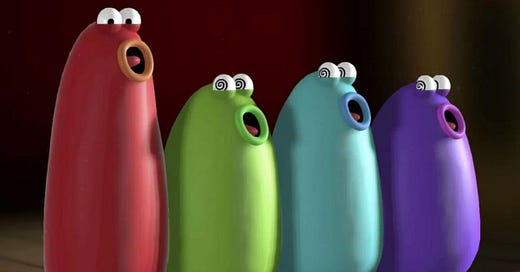#193 - Dizzying aspects
Hello
We're nearly there, everyone. We're nearly there.
Blob Opera is a machine learning experiment by David Li in collaboration with Google Arts & Culture. I encourage you to get a Zoom call with some others and create a glorious racket.
What will people pay for?
The Insights Alliance (Indigo, Baker Richards, and One Further) have released the latest findings from Culture Restart, an ongoing survey of cultural audiences' intention to attend events, and attitudes to digital content. On the latter, 65% of respondents have indicated a willingness to pay, although it differs for different types of content.
Sean Kelly Streaming Pricing Case Study. Dave Wakeman chats pricing strategies for digital content with Vatic's Sean Kelly on the Business of Fun podcast.
Digital Performances In Their Infancy from JCA Arts Marketing have looked at transactional data from "six theatrical organizations of various sizes who hosted digital performances in the first six months of the pandemic" to see what they could learn.
What will you pay for? Education, education, education. Ash Mann on "surprising levels of success around workshop, participation and learning activity delivered online".
On the video front, Kate from Supercool and Michael from Cog Design have been talking about the options for video streaming, since everyone realised that you can't put Vimeo or YouTube embeds behind your own paywall.
Virtual tours
Virtual Tours: High Interaction Cost, Moderate Usefulness. Nielsen conducted "a qualitative study with 16 users to find out the good, the bad, and the dizzying aspects of modern virtual tours".
Although, as with most things of this ilk, if the destination is compelling enough then people won't mind a few bumps in the road. A couple of cases in point:
The House on Blue Lick Road (which, if you've not seen it, is probably the best thing in this email after the opera blobs)
Donald J. Trump Presidential Library (no, of course it's not real)
Museum social media
If you (or someone you know) manages social media for a museum, please take this quick survey about how approaches have differed (or not) over the past year. My colleague Alix presented some findings at the MCG Conference but there's still time to take part and get the report.
Why creating good social media content in large organisations is hard. From Georgina Brooke, outgoing Digital Media Content Manager at National Museums Scotland (they're recruiting).
Airtable
A couple of case studies. I don't usually link to this kinda promotional thing, but these were interesting enough:
How New York City Ballet manages a marketing pipeline with Airtable
How the Mingei Museum moved 26,000 pieces of art (without a hitch)
Miscellaneous
ACMI launches innovative new online experience. I quite like the observation that "the audience has caught up with the potential of what a digital platform can give you."
Mapping Scotland's accused witches through Open Data. From the NLHF "This Halloween, we discover how Open Data helped connect the public to some of history’s most mispresented women".
Germany to create central digital platform for museum objects acquired in colonial context
Why should you open up your digital collections for reuse - explained in GIFs. Europeana use GIFs to answer the question "why open up digital collections for reuse?"
Digital Jobs
There are digital-related jobs going at National Museums Scotland, Yorkshire Sculpture Park, National Trust, and the Royal Collections Trust.
Thanks for reading. Please do share the good stuff far and wide.





